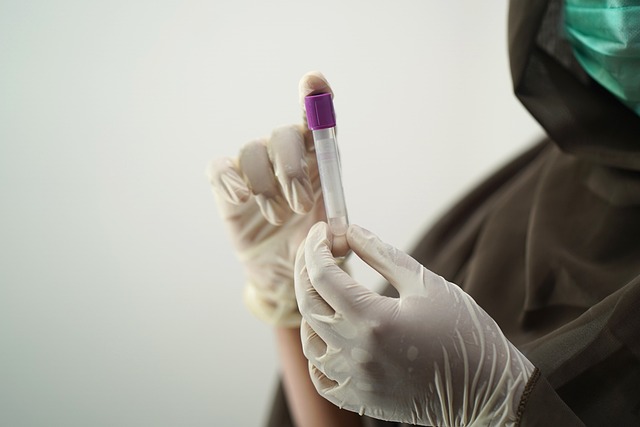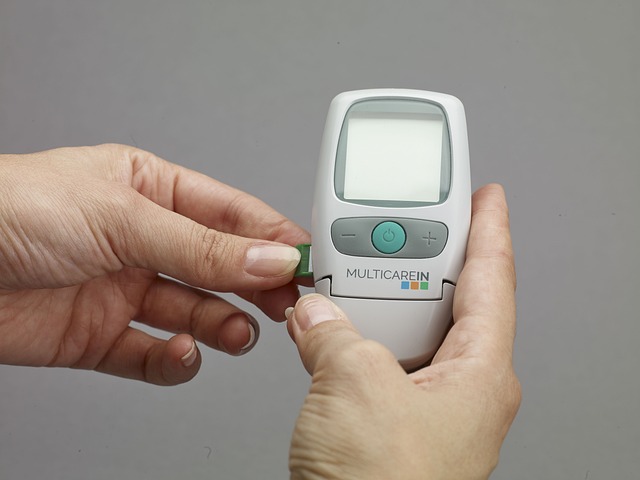The UK's healthcare system leverages hormone analysis and the UK Cholesterol Blood Test as key tools for diagnosing and managing reproductive health issues. By measuring estrogen, progesterone, testosterone, total cholesterol, LDL, and HDL levels, healthcare providers can identify hormonal imbalances in conditions like PCOS and endometriosis, which affect menstruation and conception. These tests are crucial for personalized treatment plans, leading to improved diagnosis and intervention success rates, and for monitoring the progress of treatments, especially in fertility treatments and chronic reproductive condition management. The UK Cholesterol Blood Test is particularly important as it not only assesses cardiovascular health but also influences hormonal balance and fertility by reflecting lipid profiles that impact steroid hormone synthesis. This comprehensive approach to hormone testing, including the evaluation of FSH, LH, estradiol, progesterone, and AMH, alongside advanced analytical techniques like liquid chromatography-tandem mass spectrometry (LC-MS/MS), ensures a detailed understanding of reproductive health. This allows for more effective treatment strategies within the UK's healthcare system, helping couples navigate their fertility challenges with greater precision and support.
Navigating reproductive health concerns can be a complex journey, often requiring precise medical interventions. In the UK, hormone analysis plays a pivotal role in diagnosing and managing reproductive issues, offering insights into fertility challenges and hormonal imbalances. This article delves into the nuances of hormone testing, exploring the significance of the UK Cholesterol Blood Test in relation to reproductive health. We will guide readers through the latest advanced hormone testing techniques, providing valuable information for couples encountering fertility hurdles. Understanding the intricacies of these tests is key to unlocking the path to conception and maintaining hormonal harmony. Join us as we explore this critical aspect of reproductive health care in the UK.
- Understanding Reproductive Health: The Role of Hormone Analysis in Diagnosing and Managing Reproductive Issues in the UK
- Deciphering Cholesterol Levels: How the UK Cholesterol Blood Test Relates to Fertility and Hormonal Balance
- Advanced Hormone Testing Techniques in the UK: A Comprehensive Guide for Couples Facing Reproductive Challenges
Understanding Reproductive Health: The Role of Hormone Analysis in Diagnosing and Managing Reproductive Issues in the UK

In the UK, hormone analysis plays a pivotal role in understanding and managing reproductive health issues. Reproductive health can be significantly impacted by hormonal imbalances, which can lead to various conditions such as polycystic ovary syndrome (PCOS), endometriosis, and infertility. Hormone analysis involves measuring the levels of key hormones like estrogen, progesterone, and testosterone, which are crucial for the reproductive cycle. This assessment is instrumental in diagnosing underlying issues that may cause irregular menstrual cycles, difficulty conceiving, or symptoms indicative of hormonal disturbances. The UK Cholesterol Blood Test is often integrated into this analysis as cholesterol levels can influence overall hormone health and are linked to conditions like PCOS. By providing a comprehensive picture of an individual’s hormonal status, healthcare providers can tailor treatment plans that address the specific needs of each patient. This personalized approach to reproductive health management not only improves diagnosis but also enhances the effectiveness of interventions, leading to better outcomes for those seeking to understand and address their reproductive health concerns in the UK.
Furthermore, hormone analysis is a dynamic tool that helps monitor treatment progress. For instance, women undergoing fertility treatments can benefit from regular hormone checks to ensure that their hormonal levels align with the optimal window for conception. Similarly, patients managing chronic reproductive conditions such as PCOS or endometriosis use hormone analysis to adjust their treatment protocols as needed, ensuring that their therapies remain effective over time. The integration of hormone analysis in the UK’s healthcare system is a testament to the country’s commitment to advancing reproductive health care and providing patients with evidence-based interventions tailored to their unique needs.
Deciphering Cholesterol Levels: How the UK Cholesterol Blood Test Relates to Fertility and Hormonal Balance

The UK Cholesterol Blood Test plays a pivotal role in understanding an individual’s hormonal balance and its potential impact on fertility. Cholesterol, often perceived in relation to cardiovascular health, is also a crucial precursor to the production of steroid hormones, including those vital for reproductive functions. Elevated or imbalanced cholesterol levels can disrupt the synthesis of these hormones, affecting ovulation and sperm production, and potentially leading to fertility issues. The comprehensive analysis provided by the UK Cholesterol Blood Test encompasses total cholesterol, LDL (low-density lipoprotein), and HDL (high-density lipoprotein) levels, offering a detailed picture of an individual’s lipid profile. For those grappling with reproductive difficulties, this test can provide insights into whether hormonal imbalances stem from cholesterol abnormalities. It is imperative for individuals undergoing fertility assessments to consider their lipid profiles as part of a holistic approach to diagnosing and treating reproductive disorders. The UK Cholesterol Blood Test, by offering precise measurements of these key lipids, enables healthcare providers to tailor interventions that target both cardiovascular and hormonal health, thereby supporting overall well-being and fertility potential.
Advanced Hormone Testing Techniques in the UK: A Comprehensive Guide for Couples Facing Reproductive Challenges

Couples in the UK facing reproductive challenges have access to a suite of advanced hormone testing techniques that can provide insightful information about fertility and hormonal imbalances. The UK Cholesterol Blood Test is one such technique that measures the levels of cholesterol, which is crucial for assessing ovarian reserve—a key factor in a woman’s ability to conceive. This test, along with other hormone assays, offers a comprehensive picture of the reproductive health landscape by evaluating follicle-stimulating hormone (FSH), luteinizing hormone (LH), estradiol, progesterone, and anti-Müllerian hormone (AMH) levels. These hormones play pivotal roles in the ovarian cycle and can indicate whether a woman is in a fertile window or if there may be underlying issues affecting her fertility.
For couples seeking to understand the root causes of their reproductive difficulties, these tests are integral. They enable healthcare providers to tailor treatment plans more effectively, whether it’s for ovulation induction, assisted reproductive technologies like IVF, or monitoring during a cycle. The UK’s healthcare system offers these advanced hormone testing techniques through National Health Service (NHS) fertility clinics and private clinics alike. With the advent of highly sensitive analytical methods, such as liquid chromatography-tandem mass spectrometry (LC-MS/MS), the precision and accuracy of these tests have significantly improved, providing couples with reliable information to navigate their reproductive journeys.
In concluding this discourse on reproductive health within the UK, it is clear that hormone analysis plays a pivotal role in diagnosing and managing fertility issues. Through the lens of advanced testing techniques and the interpretation of cholesterol levels via the UK Cholesterol Blood Test, couples now have more tools at their disposal to navigate the complexities of reproductive health challenges. This comprehensive guide underscores the importance of these analyses in providing personalised treatment paths, thereby enhancing the chances of conception and improving overall reproductive well-being for individuals across the UK. With the advancements in hormone testing, hope is on the horizon for those facing fertility difficulties.
